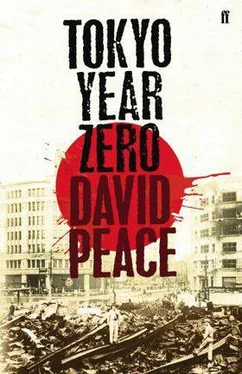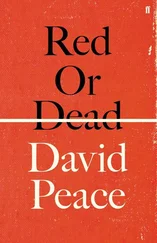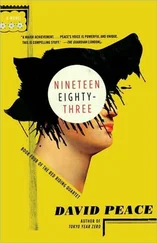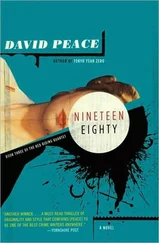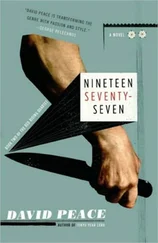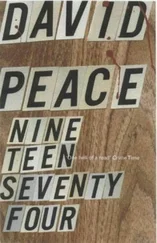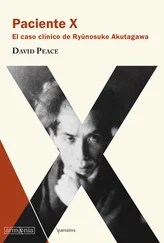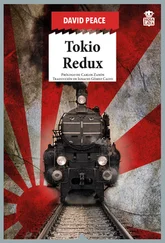There are greens and blues here –
In the Land of the Living –
There are colours.
*
The truck labours up the side of one small mountain and down its other side and then up another until it pulls up outside a detached house that faces out onto the road and we all climb out. There is a dog asleep in the shade of the wall but it is still tethered to a pole –
It is not a stray, its house not lost, its master here …
Black and large, better fed than most of the people of Tokyo, I watch its belly rise and fall, its eyes closed, tongue hanging out –
‘That lazy dog is a guard dog,’ laughs Chief Tachibana.
‘Do you get much burglary round here?’ asks Ishida.
‘There are always the Scavengers,’ nods Tachibana. ‘And before that were the Chinks, always escaping from the factories…’
‘He’d have been a hunting dog, then,’ says the driver.
Tachibana looks at the dog and laughs again. Then the chief excuses himself as he goes into the house ahead of us –
The old driver lights a cigarette and tells us, ‘A lot of them old hunting dogs are running wild now, in packs…’
Tachibana returns with the mother of the Widow Okayama, who bows and welcomes us as Tachibana introduces us and explains to the old woman why we have come as Ishida and I apologize for the early hour and abruptness of our visit, calling on her unannounced.
The mother of the Widow Okayama bows again and invites us into her house. The mother is very old and her granddaughter is not here today. But the mother is not alone. An old man is sat in the empty fireplace. The mother of the Widow Okayama rents this house from this man. This man named Koito. This man Koito doesn’t usually much like the police and he doesn’t usually much like city folk. The mother of the Widow Okayama doesn’t really remember anyone called Kodaira Yoshio but this man Koito remembers him –
‘I liked Mr. Kodaira because he was born round here, born up in Nikkō. He came here a number of times hunting for supplies –
‘He was a friendly fellow was Kodaira, very friendly. He always had money to buy with or things to exchange, did Kodaira. I introduced him to a number of other people round here, folk I knew would be willing to trade with a local fellow like him…’
I ask him for their names and their addresses –
‘I know it’s not strictly legal,’ he says, looking at Tachibana. ‘But everybody does it. If they didn’t they’d starve…’
I ask him again for names and addresses –
‘Not all as lucky as the likes of you…’
I hate the countryside. I hate it …
I crack my knuckles and I ask him for their names again, their addresses. I ask him one last time and now Koito sighs and begins to list the names, the names of local farmers and their families, every local farmer, every family he can think of, he can remember –
Kashiwagi, Kiyohara, Fujisaki, Yoshimura …
‘How many times did Kodaira come up here?’ I ask him but this man Koito shrugs his shoulders and says he can’t be sure, he didn’t keep a record, did he? Then I turn to the old grandmother –
The grandmother asks again, ‘Who is this Kodaira?’
Dr. Nakadate estimated that the second body in Shiba Park had been killed sometime between the twentieth and the twenty-seventh of July, and the advertisement found in the pocket of her dress was dated the nineteenth of July, so I want to know if Kodaira Yoshio came here again after the nineteenth of last month, if he was here and what he brought, what he brought and exchanged …
I turn back to Koito. I ask, ‘When was his last visit?’
But Koito just shrugs his shoulders again and says he can’t be sure, that he doesn’t keep records, does he? But now I crack my knuckles again and I lean forward and I hiss, ‘Then think!’
‘Her granddaughter would know better than me,’ he says. ‘There may have been times when he was here and I was not, for all I know, and it was her he came to see anyway…’
And the grandmother asks again, ‘Who is this man?’
I need to speak to the granddaughter but they don’t know where she is or what she’s doing though they swear she will be back tonight, that she will be here if we come back tomorrow…
‘We’ll be back then,’ I promise them.
*
The Kashiwagi family lives further up the same mountain. He walks behind me . There is only so far the truck can go so then we walk, Tachibana showing me the way, Ishida walking behind –
He walks behind me. He walks behind me …
Up the mountain and through the heat –
No one is who they say they are …
Through the insects and their teeth –
No one is who they seem …
The Kashiwagi family makes fuel for the hand-warmers that are used in the winter. Last winter was the worst winter on record. The Kashiwagi family made a lot of fuel for hand-warmers last winter. The Kashiwagi family also made a lot of money last winter. And a lot of visitors called upon the Kashiwagi family last winter –
Kodaira called upon the Kashiwagi family last winter –
Baba Hiroko was murdered last winter.
Baba Hiroko was found dead on the third of January this year. Baba Hiroko was last seen alive on the thirtieth of December –
Kodaira was here last winter. Kodaira was here …
The Kashiwagi family is a nervous, sullen family. The Kashiwagi family just sits and stares and offers us no tea or water –
‘Do you remember exactly when Kodaira came here…?’
But the Kashiwagi family does not remember exactly –
‘You remember if it was before or after New Year…?’
The Kashiwagi family does not want to remember –
‘But you remember what he traded…?’
The Kashiwagi family claims not to remember what Kodaira Yoshio traded for their hand-warmer fuel. But the Kashiwagi family is lying because country-folk never forget anything –
I hate the countryside. These country-folk …
Because country-folk remember everything; every last piece of fuel and every last grain of rice; every single coin and every single note they have ever received; every single item accepted in a trade –
I hate them. I hate them all …
That is why their unmarried daughter is fiddling with her wristwatch. That is why she has been fiddling with it since we sat down. That is why I reach across their hearth to grab her wrist –
Why I hold this watch on her wrist up to her face –
‘Is this what friendly Mr. Kodaira gave you?’
Chiku-taku. Chiku-taku …
This watch I now tear from her wrist. This watch I turn over in my hand to the light. This watch with an inscription on its back –
An inscription that states, Miyazaki Mitsuko …
This watch that was not Kodaira’s to trade –
That screams, Miyazaki Mitsuko…
This watch. This watch…
Not theirs to keep –
This watch …
That I stuff into my knapsack as I get to my feet to leave –
Tachibana asking, ‘But who is Miyazaki Mitsuko?’
*
The daylight blinding, my eyes squinting, in this Land of the Living, in this Land of Plenty, before their mountains, before their trees, before their fields, their leaves and their flowers, their rivers and their streams, their greens and their blues, in this Land of the Living –
Before his mountains, his trees, his fields –
I say, ‘Miyazaki Mitsuko was a nineteen-year-old girl from Nagasaki whose naked body was found on the fifteenth of August last year in an air-raid shelter of the Women’s Dormitory Building of the Dai-Ichi Naval Clothing Department near Shinagawa in Tokyo.
Читать дальше
